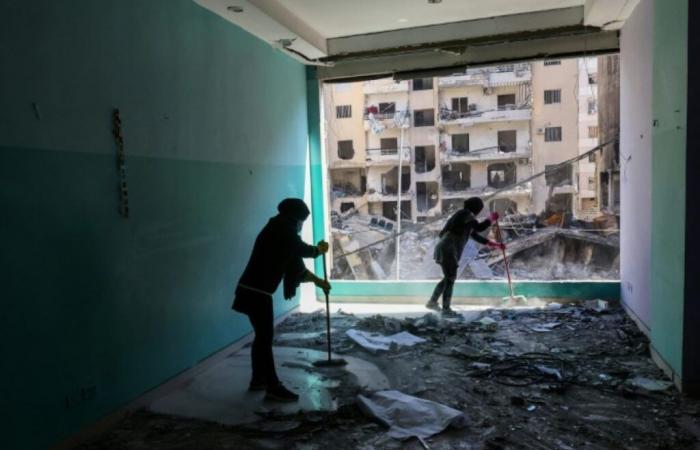Nine people were killed in Israeli strikes on villages in southern Lebanon on Monday, after Israel announced it was striking dozens of Hezbollah targets in retaliation for an attack claimed for the first time since the cease-fire took effect. the fire, which “holds” according to Washington.
On Monday evening, the Israeli army announced that it had struck dozens of Hezbollah targets across Lebanon, including “terrorist launch pads and infrastructure.”
The Lebanese Health Ministry said the raids killed five people in the village of Harris and four in the village of Tallousa, in the south of the country.
Previously, Israeli Prime Minister Benjamin Netanyahu described as a “serious violation” the shooting by the Lebanese pro-Iranian movement towards a disputed area on the borders of Lebanon and the part of the Syrian Golan occupied and annexed by Israel, promising to “react with force”.
– “The ceasefire holds” –
The United States, Israel's main ally, affirmed that the truce in force since November 27 held and that they were examining the accusations from both camps. “The ceasefire is holding,” State Department spokesman Matthew Miller said.
Mr. Berri called on the committee responsible for overseeing the truce, which includes the United States and France, “to urgently begin its action and force Israel to stop its violations and withdraw” from Lebanese territory.
The head of French diplomacy, Jean-Noël Barrot, for his part insisted on Monday with his Israeli counterpart, Gideon Saar, on “the need for all parties to respect the ceasefire”, his ministry indicated.
The Israeli minister rejected any accusation of violating the ceasefire. “On the contrary, Israel is enforcing it” in response “to Hezbollah’s violations which call for immediate action,” he said.
Hezbollah said it had fired on an Israeli military position, on “the occupied hills of Kfar Chouba”, an area neighboring the Shebaa Farms and currently under the control of the Israeli army.
This is a “first defensive response” to “violations” of the ceasefire by Israel, he assured.
The Israeli army reported “two projectiles” which did not cause any injuries.
Israeli Defense Minister Israel Katz promised a “strong response” to Hezbollah fire which he said targeted “an army base in Har Dov”, the Hebrew name for the Shebaa Farms.
Several Israeli strikes have targeted Lebanon since the ceasefire came into force, without Hezbollah announcing any response until then.
– “We are starting from scratch” –
Thanks to the truce, traders in the suburbs of Beirut were busy Monday cleaning up the damage caused by the conflict and reopening their shops.
“I reopened my store today, we are organizing and putting everything, our merchandise, back in its place, and we are starting from scratch,” Ali Qima Zaiter, store owner, told AFP.
Mohammad Yassine, who owns a bakery, saw his store “slightly damaged by a nearby strike.” “I have been repairing the damage for four days and, God willing, tomorrow Tuesday, we will reopen the store,” he explains to AFP.
Monday from Riyadh, French President Emmanuel Macron and Saudi Crown Prince Mohammed bin Salman “indicated that they would continue diplomatic efforts to consolidate the ceasefire” in Lebanon and called for “the holding of a presidential election in Lebanon with the aim of (…) carrying out the reforms necessary for the stability and security of the country”, reported the Elysée in a press release.
– Israeli strikes –
On Monday, an Israeli drone targeted a Lebanese military post in Hermel, in the eastern Bekaa plain, far from the border with Israel, injuring a soldier, according to the Lebanese army.
A man was also killed by an Israeli drone strike on the village of Marjayoun, close to the border, according to the Lebanese Ministry of Health.
The Israeli army said earlier Monday that it had “targeted military vehicles operating in the area of a Hezbollah missile manufacturing site in the Bekaa.”
It added that it had struck sites “used for arms smuggling near the Syrian-Lebanese border in the Hermel region” and had carried out “several strikes in response to Hezbollah terrorists” in southern Lebanon.
The ceasefire agreement, which ended two months of open war between Israel and Hezbollah, provides for the withdrawal within 60 days of the Israeli army from Lebanon. Israeli soldiers entered southern Lebanon on September 30, a week after launching a massive aerial bombardment campaign against Hezbollah.
Hezbollah, for its part, must retreat north of the Litani River, around 30 kilometers from the border, and dismantle its military infrastructure in southern Lebanon.
As soon as the agreement was announced, Israel said it reserved “total freedom of military action” in Lebanon, if Hezbollah “violated” the ceasefire and “attempted to rearm”.
The formation opened a “support front” for Hamas after the unprecedented attack by the Palestinian Islamist movement against southern Israel, which triggered the ongoing war in the Gaza Strip on October 7, 2023.
The Israeli army on Monday called on the population to evacuate areas of Khan Younes, in the south of the Palestinian territory, in anticipation of new operations.






